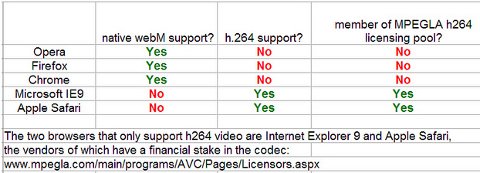Pascal Bleser Incident in OpenSUSE Project Shows Community Problems
Summary: Some cryptic development within the OpenSUSE community shows continued unrest and Pascal Bleser is out of the board
THE OPENSUSE community is in a bit of a state of disarray. Amid Novell’s plan to be sold to AttachMSFT (not finalised yet and there are objections), members of OpenSUSE are uncertain about commitments, as we explained the other day.
OpenSUSE’s fairly new community manager, Jos Poortvliet [1, 2], came at the time that some key people were leaving. He says that the community wants an OpenSUSE foundation.
The openSUSE Linux version is going to a foundation because users demanded it, says Novell’s community manager Jos Poortvliet
But here comes the interesting part from the press around that area:
The openSUSE Board elections process, which began in December last year, has now moved into the election phase and the final results will announced on January 26, 2010.
The board has 2 seats open for this election as Pascal Bleser and Henne Vogelsang terms are expiring.
Pascal is a longtime prominent member and he is quite vocal. He now explains why he is “not running for the openSUSE Board”:
The reason is simple: I have been elected on the two previous Board instances, and have also been part of the initial “bootstrap Board” (as I like to call it) where there were no elections (chicken/egg) and where our primary mission was to set up an election process.
This claim is conflicted somewhat by this one from Susan:
Today Pascal Bleser, openSUSE packager and Board member, posted a message to the openSUSE Project mailing list announcing the decision of the openSUSE Board to “revoke an individual’s membership as well as his access to the openSUSE infrastructure.” The only explanation given was that this member had repeatedly violated the Guiding Principals and rejected any attempts for intervention. The message was so cryptic and secretive that it actually provoked more questions than it originally had intended to answer.
That sounds rather different, does it not? There is even a reference to Pascal (not by name) in this message which got pinned at LWN:
As you probably all know by now, the openSUSE Board recently revoked an individual’s membership as well as his access to the openSUSE infrastructure.
Pascal’s absence is rather striking because he used to win the elections very easily. The candidates now are:
* Chuck “PUP” Payne, ambassador from the US (blog) Platform
* sebas, open-slx user experience expert (blog) Platform
* Kostas Koudaras, ambassador from greece (blog) Platform
* Peter Linnell aka mrdocs, OSS It consultant Platform
* Henne Vogelsang, Booster, currently Board Member, Novell (blog) Platform
* Sankar P, Programmer, Hacker, FOSS Enthusiast, Novell (blog) Platform
* Nelson Marques, Contributor (blog) Platform
In other news about the project (there is not much [1, 2, 3]), members still insist on getting more power as the project is dominated by Novell.
The ballots are open and now the power is in the hands of people of openSUSE to decide whom they want to have on the board for the next year. The openSUSE community is a true democratic community so the elections procedure for it, is a celebration of ideas. All the candidates have proved our love for what we do and we are all devoted to the openSUSE project and its community.
For Novell, one of the first steps towards assuring that the community has some control is to review the trademark guidelines or simply annual them.
In 2009, a set of trademark guidelines were created to help define how the community and beyond could use the openSUSE logo and related trademarks in their own products and services. Along with this, Novell granted powers to the openSUSE Board to be the guardians of the openSUSE trademarks. This included ensuring that proper usage followed the guidelines as well as giving the Board the ability to review special use cases
This seems like an improvement, but the OpenSUSE Board still has Novell employees in it. Does anybody know what Pascal did to get treated as he is alleged to have been treated? █
Mono in ‘Damage Control’
Summary: Mono/.NET boosters have initiated another wave of ruthless personal attacks to defend the indefensible
AS many people can tell, Techrights has been getting a lot of flak from the Mono community over the past week or so. Whether it’s in blogs, in IRC, microblogging or whatever, the Mono community is scrambling to respond to the latest PR problem that they have. Always ask yourself though, are they actually addressing the criticisms? Or are they attacking people and their respective platform? If it’s the latter (which it overwhelming is), then it means they have no counter argument and they resort to the lowest from of defence. While it is true that some sites still cover Mono applications (but not as many sites as there used to be), there is usually a warning about the nature of Mono and that's important progress. Mono boosters spin it. They are still in denial over the FSF's stance for example. It’s like the rejected boyfriend who keeps pretending his ex-girlfriend loves him. The truth of the matter is, more and more people are fed up with Mono and those many personal attacks on Mono critics (misquoting, out of context quoting, false associations, cheap smears, disinformation, etc.) are no longer effective. Their shelf life is due. To repeat the take-home message, when viewing a defence of Mono, check to see if it’s an attack on messengers or a real defence. Unpopular opinions are not incorrect opinions and they initially put the source at risk. █
Iran Shows the Downside of Using Proprietary Software
Summary: Danger of depending on someone else’s secret code (Microsoft Windows) demonstrated by Stuxnet and the collateral damage of spreading of viruses by governments
Conspiracy theory? No, not just a theory anymore. There are loads of articles derived from the first one this weekend:
• Israel Tests on Worm Called Crucial in Iran Nuclear Delay
Behind Dimona’s barbed wire, the experts say, Israel has spun nuclear centrifuges virtually identical to Iran’s at Natanz, where Iranian scientists are struggling to enrich uranium. They say Dimona tested the effectiveness of the Stuxnet computer worm, a destructive program that appears to have wiped out roughly a fifth of Iran’s nuclear centrifuges and helped delay, though not destroy, Tehran’s ability to make its first nuclear arms.
• ‘Israel tested Stuxnet on Iran, with US help’
US and Israeli intelligence services collaborated to develop a destructive computer worm to sabotage Iran’s efforts to make a nuclear bomb, The New York Times reported on Saturday. In its online edition, the Times quoted intelligence and military experts as saying Israel has tested the effectiveness of the Stuxnet computer worm, which apparently shut down a fifth of Iran’s nuclear centrifuges in November and helped delay its ability to make its first nuclear weapons.
The testing took place at the heavily guarded Dimona complex in the Negev desert housing the Middle East’s sole, albeit undeclared nuclear weapons program. Experts and officials told the Times the effort to create Stuxnet was a US-Israeli project with the help, knowingly or not, of Britain and Germany.
It’s called “an admission against interest” in legal circles. Example: When the New York Times says something good about George W. Bush. It was George W. Bush’s fault, the NYT just confessed, that the Stuxnet computer worm ended up destroying 984 Iranian uranium centrifuges over the last year or so. Bush got the Stuxnet program started in cooperation with Israel and other countries in the last years of his presidency.
• Israel tested worm linked to Iran atom woes – report
It added it was not clear the attacks were over and that some experts believed the Stuxnet code contained the seeds for more versions and assaults.
What about all the innocent businesses and homes that got infected by the same worm? Can they sue the involved governments for damages? Why is it OK for governments to do what people normally go to jail for?
It ought to be mentioned that Techrights covered this like 3 times before (see links below), but only now is it more confirmed. █
More on Stuxnet:
- Ralph Langner Says Windows Malware Possibly Designed to Derail Iran’s Nuclear Programme
- Windows Viruses Can be Politically Motivated Sometimes
- Who Needs Windows Back Doors When It’s So Insecure?
- Windows Insecurity Becomes a Political Issue
- Windows, Stuxnet, and Public Stoning
- Stuxnet Grows Beyond Siemens-Windows Infections
- Has BP Already Abandoned Windows?
- Reports: Apple to Charge for (Security) Updates
- Windows Viruses Can be Politically Motivated Sometimes
- New Flaw in Windows Facilitates More DDOS Attacks
- Siemens is Bad for Industry, Partly Due to Microsoft
- Microsoft Security Issues in The British Press, Vista and Vista 7 No Panacea
- Microsoft’s Negligence in Patching (Worst Amongst All Companies) to Blame for Stuxnet
- Microsoft Software: a Darwin Test for Incompetence
- Bad September for Microsoft Security, Symantec Buyout Rumours
- Microsoft Claims Credit for Failing in Security
- Many Windows Servers Being Abandoned; Minnesota Goes the Opposite Direction by Giving Microsoft Its Data
- Windows Users Still Under Attack From Stuxnet, Halo, and Zeus
- Security Propaganda From Microsoft: Villains Become Heroes
- Security Problems in iOS and Windows
- Eye on Security: BBC Propaganda, Rootkits, and Stuxnet in Iran’s Nuclear Facilities
- Eye on Security: ClamAV Says Windows is a Virus, Microsoft Compromises Mac OS X, and Stuxnet Runs Wild
- Windows Kernel Vulnerability for Thanksgiving, Insecurity Used for Surveillance Again
- Cablegate Reveals Government Requesting Access to Microsoft Data, Kill Switches
- Use Microsoft Windows, Get Assassinated
01.15.11
Apple’s and Microsoft’s WebM/Ogg Phobia Means These Formats Are Good for Freedom
Summary: Microsoft takes its opposition to royalty-free codecs up a notch
AS we routinely emphasise, knowing what’s good for software freedom is an exercise which sometimes involves watching the reactions from freedom opponents such as Apple and Microsoft. Apple’s and Microsoft’s love of the MPEG-LA cartel (at the expense of Ogg and WebM) only makes it more apparent that MPEG-LA, which is headed by a patent troll, empowers proprietary software giants. They can accept patent thickets, whereas small businesses cannot.
Now, watch this picture from Bruce Lawson. Here is a copy (with attribution):
It is self-explanatory, is it not? Here is an article about the backlash which mostly came from Microsoft, using ridiculous analogies in a spin piece. Jan Wildeboer called it “Palinizing use of language by MSFT on Google and #webm #vp8 IMHO.” He asked: “Can we haz civilised discussions, plz?”
Microsoft booster Peter Bright chose the headline “Google’s dropping H.264 from Chrome a step backward for openness” and people can see the responses from LWN. Sag Arun wrote: “Is microsoft is filled with people like http://ur1.ca/2tkos #compares H.264 with english #fail” █
Reviewers, LG and Dell Show No Love for Vista Phony 7 Just Yet
Summary: Vista Phony 7 [sic] does not get the channel quite so excited rather than reluctant about everything (LG and Dell are the examples named in the news)
Vista Phony 7 is a poor product. One British review says that “Windows Phone 7 can’t yet hold a candle to iOS or Android for polish or content.” In response to this, a reader of ours wrote in Identi.ca: “Good, at least one Microsoft product doesn’t hold a candle. Tired to hear Linux doesn’t hold candles…”
Here are some more reviews of the platform, bearing headlines like “Early Reviews Peg Windows Phone 7 As Still Lagging Behind iOS”; “Microsoft Windows Phone 7 Is OK, but Has Holes, Reviews Say”; “Top 5 things I dislike about Windows Phone 7″; “Windows Phone 7: Microsoft’s Disaster”; “Microsoft Windows 7 phone: Poor cousin of iPhone for the money conscious Indian market?” and “Confessions of an iPhone User: Why I Don’t Like Windows Phone 7″,. Watch the MSNBC spin and mind Dell’s delays [1, 2, 3, 4, 5, 6], which we interpret as Dell putting this under a low priority amidst other problems it has given Microsoft:
A batch of court documents The New York Times pressed to unseal has more details about a flood of faulty computers the company sold in 2003 to 2005.
Dell also develops some devices with Android, preinstalls GNU/Linux on servers, and sells PCs with Ubuntu on them.
For those who believe that only Dell is a Microsoft partner that gets cold feet, well… how about LG? As Microsoft’s Bright booster puts it, based on this new report, “LG [is] disappointed by Windows Phone 7 launch” (more reasons for Dell to call the whole thing off).
LG has gone on record saying that Windows Phone 7 hasn’t performed as well as it thought it would, following the launch of the mobile OS in October.
“From an industry perspective we had a high expectation, but from a consumer point of view the visibility is less than we expected”, James Choi, marketing strategy and planning team director of LG Electronics global told Pocket-lint in a one-to-one interview.
In light of many problems that may or may not have culminated in Vista Phony 7′s failure, more and more people call for Steve Ballmer’s resignation/ousting and the latest such call comes from ZDNet’s main blog:
At the time, I wrote that it may be time to yank Microsoft off of the keynote stage. But maybe it’s not Microsoft that needs to go. Maybe it’s Ballmer.
Times are getting interesting now that Windows becomes rather extinct in the mobile arena, which is one of the fastest-growing markets. █
Microsoft Exploits Haiti Disaster (Again) to Market SharePoint
“Let them eat SharePoint…”
Summary: SharePoint marketing through sentimental blackmail at Microsoft’s official blog, courtesy of suffering children in Haiti
EXPLOITATION of the earthquake in Haiti is a subject we covered in reference to Microsoft and also the Gates Foundation. “Disaster capitalism” — where a chilling disaster is being used to create dependence (e.g. lock-in) on “heroic leader” or “corporate saviour” — is something we have all learned from Katrina too (there is good literature on the subject). Rather than return to old stories about it we wish to show Microsoft’s latest Haiti exploitation, which it disguises as a PR effort. Watch this thing sceptically (critical skills required) as they even use a photo for sentimental blackmail. It’s the obligatory script and it says:
OneResponse, an online platform based on Microsoft SharePoint, contains vital pieces of data such as contact lists, meeting schedules and results of needs assessments to assist with the humanitarian response.
What a lovely advert. It is utterly disgusting when someone’s pain is being used not only to create a dependency on SharePoint, which itself can be quaky at times, but also to advertise oneself. As Razvan Sandu put it over at Identica, “Can you image people affected by an earthquake clicking in Microsoft Sharepoint? Commercial propaganda has no limits?” █
Denmark the Latest Country to Allow Vista 7 Refunds to PC Buyers Who Disown Microsoft
Summary: A Danish report from yesterday says that Windows unbundling is taken one step further (Windows tax of about $150 gets deducted)
THIS new report about Denmark has not been translated into English yet, but it is major news which on top of similar cases in Brazil and Portugal (both involving Vista 7 refunds) help create a market where GNU/Linux is recognised and may sooner or later be preinstalled on more desktops and laptops. To quote a small correction of Google’s automated translation.
EDIT: Google translate is not very good at translateing currencies. the refund is 850 DKK, not 850 USD
Thats approx. 150 USD.
It’s similar to the number quoted by Harish Pillay at the end of 2010 (links in [1, 2]).
The automated translation labels it an “unused Windows license”, so as we’ve seen before, therein lies the key to getting a refund. More such milestone cases are needed in more countries in order to serve as precedence and pave the way to en masse refunds, which in turn can compel a lot of shops to offer GNU/Linux and BSD. █
« Previous Page — « Previous entries « Previous Page · Next Page » Next entries » — Next Page »
































 Content is available under CC-BY-SA
Content is available under CC-BY-SA